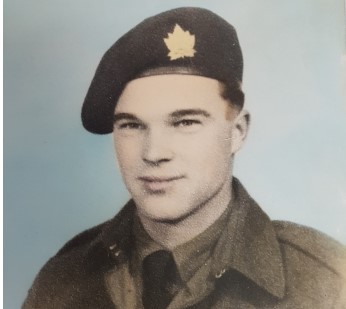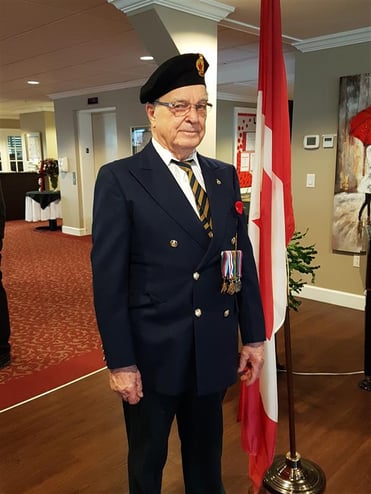As Remembrance Day approaches, we reflect on the stories of veterans like 103-year-old John Kuharski, whose memories of service are as vivid as they are heartrending. With World War II already underway John's journey began on May 8, 1940, as a young 20-year-old stepping into a dark, dangerous and uncertain world.
 Training in Canada and England
Training in Canada and England
His early days were spent training in Canada, preparing for the realities of the war he would soon face. John recalled those tense first weeks in Manitoba, before moving to Camp Borden, Ontario, for tank training. "This was all preparation before we went to Europe," he explained. His first encounter with Europe's war-torn landscape was during further training in England, where the surreal serenity of places like Salisbury Plain contrasted sharply with the reason he and his fellow Canadians were there. "I always wondered how they put that rock on top there," John mused, speaking of his time in Salisbury Plain and its most famous sight, Stonehenge.
An essential and nocturnal role
John's role in the army was a crucial one, though not often glorified in the annals of war history. He drove and helped to man a tank-fuelling truck, a task that demanded stealth, precision, and immense courage. It was a nocturnal and very secretive role that required him and his colleagues to be neither seen nor heard by the enemy. "Can you imagine driving without lights?" he asked, recalling the treacherous night missions to refuel tanks, navigating through the pitch black in potentially hostile territory. John, a current resident of The Shores retirement community, and his team were not just keeping the tanks running; they were delivering hope and sustenance for the armoured guardians that protected infantry and led assaults.
Recollections of D-Day
When speaking of D-Day and landing at Normandy, John's tone changed. June 6, 1944, was a critical turning point in the war that ultimately led to the liberation of Nazi-occupied France. His recollections of that harrowing but pivotal day - when more than 156,000 American, British and Canadian troops stormed 50 miles of fiercely defended beaches in Normandy — painted a vivid picture of chaos, bravery, and the stark reality of conflict.
 “We were on a two-decker ship, we were above and the tanks were underneath, that’s the way we landed on Normandy,” he said. “There was a lot of shelling going on and the water... it was red,” John said solemnly. Kuharski and his tank-fuelling crew landed on the unforgiving beach, carefully navigated their way to their position, and continued fulfilling their vital role. “Life was cheap. You’re taking a chance from day to day. I was driving the fuel truck when we landed on Normandy. You got a map and a code number and you went to your location.”
“We were on a two-decker ship, we were above and the tanks were underneath, that’s the way we landed on Normandy,” he said. “There was a lot of shelling going on and the water... it was red,” John said solemnly. Kuharski and his tank-fuelling crew landed on the unforgiving beach, carefully navigated their way to their position, and continued fulfilling their vital role. “Life was cheap. You’re taking a chance from day to day. I was driving the fuel truck when we landed on Normandy. You got a map and a code number and you went to your location.”
Missing his family and post-war life
Amidst the recollections of war, John's humanity shone through as he spoke of his family, of missing them deeply, and of returning to a daughter who didn't recognize him. "Who's that guy sleeping with mommy?" she asked when John returned to Canada, encapsulating the heartbreaking reality for many families post-war. She was four years old when father and daughter first met. It was a testament to the sacrifices made, not just by those who served, but by their loved ones back home.
After the war, life took John back to his roots, working the land in Manitoba, nurturing it to yield life just as he had once fought to preserve life. His journey from the horrifying battlefields to the natural tranquility of his farm is a poignant reminder of his resilience and sacrifice. This Remembrance Day, let us honour heroes like John Kuharski. They remind us that peace is hard-won, that freedom comes at a price, and that their stories, etched in time, deserve to be remembered and cherished.

.jpg)
